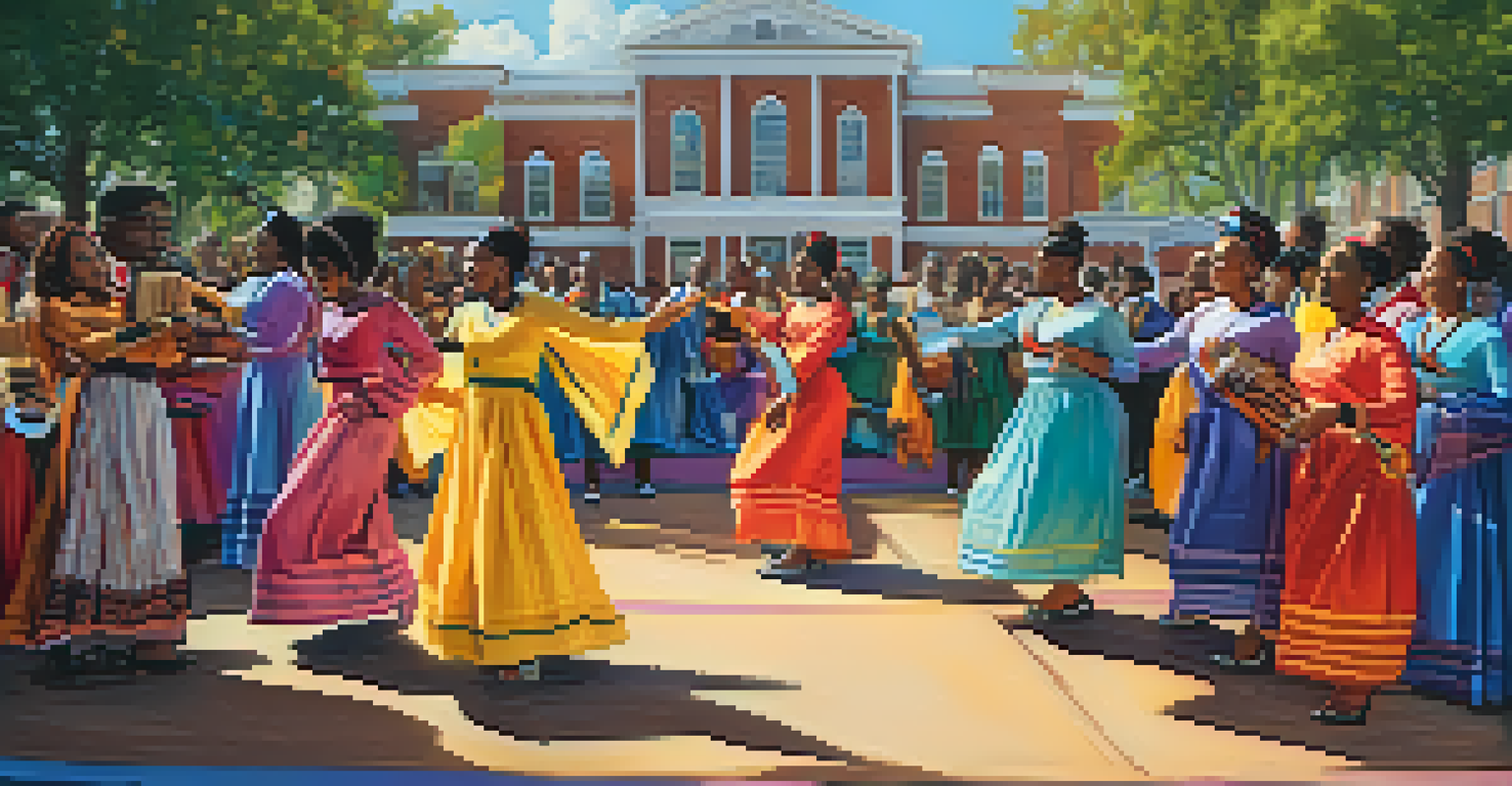The Cultural Impact of Atlanta's HBCUs on Local Communities

Understanding HBCUs and Their Role in Atlanta
Historically Black Colleges and Universities (HBCUs) have played a pivotal role in American education, particularly in the South. In Atlanta, institutions like Morehouse College, Spelman College, and Clark Atlanta University not only provide education but also serve as cultural hubs. Their rich histories are intertwined with the civil rights movement and continue to influence social justice initiatives today.
Education is the most powerful weapon which you can use to change the world.
These universities were established during a time when higher education was largely inaccessible to Black Americans. They provided a safe space for learning and cultivating leadership skills. The legacy of empowerment continues as these institutions actively foster a sense of community and pride.
Moreover, HBCUs in Atlanta contribute significantly to the local economy and culture. They attract students from across the country and the globe, creating a vibrant, diverse atmosphere that enriches the city's cultural fabric.
Community Engagement and Service Initiatives
One of the defining characteristics of Atlanta's HBCUs is their commitment to community service. Students and faculty often engage in outreach programs that address local needs, from health fairs to educational workshops. This hands-on approach not only benefits the community but also enriches the students' learning experiences.

For instance, Spelman College has initiated programs focused on health disparities in Atlanta’s underserved neighborhoods. These efforts empower students to apply their knowledge in real-world contexts, fostering a sense of responsibility and connection to their community.
HBCUs as Cultural and Economic Hubs
Atlanta's HBCUs serve as vital cultural centers and contribute significantly to the local economy.
Through partnerships with local organizations, Atlanta's HBCUs create a ripple effect of positive change. This symbiotic relationship strengthens community ties and enhances the overall quality of life for residents.
Cultural Events and Celebrations
Atlanta's HBCUs host a plethora of cultural events that celebrate Black heritage and history. Events like the AUC's Homecoming festivities and the annual Atlanta HBCU Alumni Association Gala bring together students, alumni, and community members. These gatherings not only promote school spirit but also serve as a platform for cultural exchange and networking.
The function of education is to teach one to think intensively and to think critically. Intelligence plus character—that is the goal of true education.
Moreover, these institutions often feature art shows, music festivals, and lectures that highlight the contributions of Black artists and thinkers. Such events enrich the local culture and provide a space for dialogue around important social issues.
Through these cultural celebrations, HBCUs in Atlanta keep the community connected to its roots while inspiring future generations. They create an environment where history is honored, and contemporary issues are addressed.
Economic Contributions and Job Creation
The economic impact of Atlanta's HBCUs extends far beyond their campuses. These institutions are significant employers in the region, providing jobs for thousands of faculty and staff. Their presence also drives demand for local businesses, from dining to retail, creating a thriving ecosystem.
Additionally, HBCUs play a crucial role in workforce development. They prepare students for careers in various fields, equipping them with skills that are in high demand. This not only benefits graduates but also meets the needs of local industries, fostering economic growth.
Commitment to Community Engagement
These institutions actively participate in community service initiatives, enhancing both student experiences and local well-being.
By investing in education and training, Atlanta's HBCUs are vital to the city's economic landscape. Their contributions help bridge the gap between education and employment, enhancing opportunities for local residents.
Fostering Leadership and Civic Engagement
Atlanta's HBCUs are breeding grounds for future leaders, instilling values of leadership and civic engagement in their students. Programs such as student government and leadership development workshops prepare students to take on active roles in their communities. This emphasis on leadership cultivates a generation that is politically aware and socially responsible.
Moreover, these institutions encourage students to participate in local governance and community activism. Many alumni go on to hold significant positions in public service, furthering the impact of their education on local communities.
By nurturing leadership qualities, HBCUs contribute to a vibrant civic life in Atlanta. They empower students not just to dream of change but to become the change-makers in their communities.
Promoting Diversity and Inclusion
Atlanta's HBCUs are essential in promoting diversity and inclusion within the educational landscape. Their campuses are melting pots of cultures, attracting students from various backgrounds. This diversity enriches the learning environment and prepares students for a globalized world.
Furthermore, these institutions often engage in dialogues around race, identity, and social justice. By fostering an inclusive atmosphere, they encourage students to explore and celebrate their differences while finding common ground.
Legacy of Activism and Leadership
HBCUs in Atlanta foster a strong culture of activism and leadership, preparing students to be engaged citizens and change-makers.
The commitment to diversity at Atlanta's HBCUs not only shapes student experiences but also influences the broader community. It sets a standard for inclusivity that resonates throughout the city.
Legacy of Activism and Social Change
The legacy of activism at Atlanta's HBCUs is deeply rooted in their history. From the civil rights movement to contemporary social justice initiatives, these institutions have been at the forefront of change. They continue to inspire students to advocate for equality and justice in their communities.
Events such as protests, workshops, and discussions on pressing social issues are commonplace on campus. These activities encourage students to engage critically with the world around them and become informed citizens.

This culture of activism not only empowers students but also galvanizes the community. The ripple effect of their efforts often leads to tangible changes in policies and public attitudes.
Conclusion: The Lasting Impact of Atlanta's HBCUs
In conclusion, Atlanta's HBCUs are more than just educational institutions; they are vital cultural and community pillars. Their impact is felt in every aspect of local life, from economic contributions to social activism. By fostering leadership, promoting diversity, and engaging in community service, they create a legacy of positive change.
As we look to the future, the role of HBCUs in shaping Atlanta's communities will continue to be crucial. Their ability to adapt and respond to the needs of the community ensures that they remain relevant and impactful.
HBCUs as Cultural Hubs
Atlanta's HBCUs serve not only as educational institutions but also as vital community and cultural centers that promote social justice and heritage.
Ultimately, the cultural impact of Atlanta's HBCUs serves as a reminder of the power of education and community engagement in driving social progress.